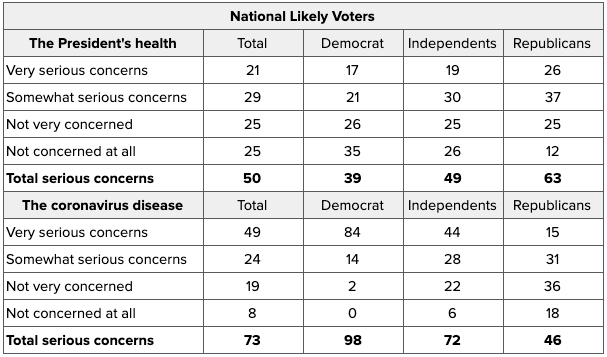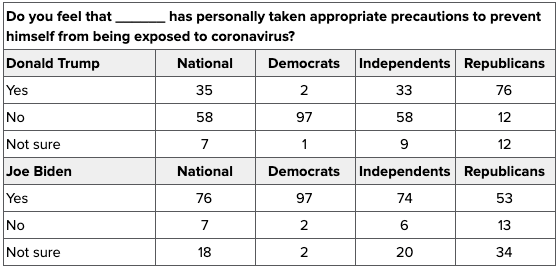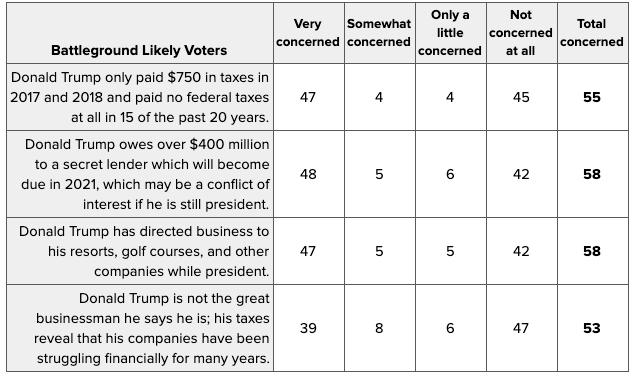Change Research/ CNBC Poll: October 2-4, 2020
Key Takeaways
This survey entered the field on Friday evening immediately after President Trump was admitted to Walter Reed Hospital with COVID-19.
- Biden leads by 10 points nationally (52% to 42%) and by 5 points across the six-state battleground (50% to 45%), with leads in all six battleground states.
- There was no improvement in the ballot in response to Trump’s diagnosis. The only evidence of a COVID-19 sympathy bump was a 5 point improvement in Trump’s net favorability over the past two weeks, and he remains +12 net unfavorable!
- Biden’s favorability is the highest it has been over the course of our polling. Opinions are net favorable for the first time nationally (47% favorable, 46% unfavorable) and are comparable in the competitive battleground (48% favorable and 49% unfavorable).
- 50% of voters nationally and 52% of battleground voters have very or somewhat serious concerns about the president’s health.
- Just 35% of voters nationally say that Donald Trump has personally taken appropriate precautions to prevent himself from being exposed to coronavirus, compared to the 76% that say that Biden has taken appropriate precautions.
- 57% nationally and 54% of the battleground continue to disapprove of Trump’s handling of COVID-19, and a 56% majority nationally and 53% of the battleground say that Biden and Democrats would do a better job handling COVID-19.
- 73% nationally and 71% in the battleground intend to watch the VP debate. By a small 3 point margin battleground voters believe that Kamala Harris will do a better job than Mike Pence (47% to 43%). Nationally, voters are more sure of Harris by 8 points (48% to 40%)
- 70% of voters were closely following news about Trump’s taxes and voters are most concerned about his conflicts of interest.
Biden +10 nationally and +5 in the competitive battleground among likely voters
Biden leads by 10 points nationally (52% to 42%), the greatest margin for him yet in our biweekly national polling. Two weeks ago, he had a 9 point advantage following the news of Justice Ginsberg’s passing. Biden also leads by 5 points in the six state battleground, the greatest margin for him in our polling since the middle of July. Critically, Biden continues to lead across each of the six states, and is earning at least half of the vote in each of these states with the exception of North Carolina.
- +6 in Arizona (51 to 45)
- +4 in Florida (50 to 46)
- +8 in Michigan (51 to 43)
- +2 in North Carolina (49 to 47)
- +4 in Pennsylvania (50 to 46)
- +7 in Wisconsin (51 to 44)
For perspective, Biden was leading by 6 points nationally for much of the late summer. This week’s polling has confirmed that rather than changing the dynamic of the race to revive his chances, the Trump campaign has lost real ground nationally and in key states.
Will Trump’s diagnosis change the state of the race? We do see a slight improvement in Trump’s favorability ratings over the past two weeks. Opinions of Trump nationally were +17 net unfavorable two weeks ago (40% favorable, 57% unfavorable) and are +12 points net unfavorable today (42% favorable, 54% unfavorable), perhaps reflecting greater sympathy for the sick president. Of course this did not produce any improvement in the ballot over the past two weeks.
What is likely more important and often unreported is the steady improvement in opinions of Joe Biden. For the first time in one of our national biweekly polls we show opinions of Biden are more favorable than not (47% favorable, 46% unfavorable). And across the battleground Biden is also increasingly popular, with 48% favorable and 49% unfavorable.
Democrats continue to lead in the Senate races as well:
- +8 Mark Kelly in Arizona (51 to 43) – this is unchanged over the past two weeks.
- +8 Gary Peters (51 to 43) – unlike other recent waves, Peters is not running behind Biden in this poll and James is no longer running ahead of Trump.
- +4 Cal Cunningham in North Carolina (50 to 46) – in the past two weeks there has been a debate and a sexting scandal in this race. While there has been some consolidation behind both candidates over the past two weeks, the margin remains steady in favor of Cunningham.
The President’s COVID-19 diagnosis and COVID-19 concerns
We informed voters that “President Trump announced that he, the First Lady, and his senior White House staffer Hope Hicks tested positive for COVID-19 early Friday morning and he went to Walter Reed Medical Center for observation on Friday evening” and asked how concerned they were about the President’s health. Half voters nationally and 52% of battleground voters had very or somewhat serious concerns about his health, with only about two-in-ten voters expressing very serious concerns. It is notable that even though Republicans are the least likely to express concerns about the coronavirus in general, they are the most likely to have serious concerns about the President’s health specifically in light of this diagnosis, while Democrats and Independents are more concerned about COVID generally than about the President’s health.

There has been a small increase in the number expressing serious concerns about the coronavirus over the past two weeks as rates rise across the country: 72% have serious concerns about the coronavirus in the battleground and 73% have serious concerns nationally (49% very serious concerns in both), up from 65% and 69% two weeks ago, respectively. This increase appears to come from those who approve of Trump’s job performance, as those who disapprove of Trump’s job performance have remained highly concerned in our polling. We also saw a decrease in the number of Trump supporters who say the impact of the coronavirus is getting better — 78% today versus 87% two weeks ago. It is possible they are internalizing the threat after the President’s diagnosis, but it also could be a familiar pattern of Trump supporters becoming increasingly concerned as rates rise. In either case, fewer than half of those who approve of Trump’s job performance are seriously concerned about COVID-19.

The President has said he now “gets” the virus. Voters continue to disagree: 57% nationally and 54% of the battleground continue to disapprove of his handling of COVID-19, with more strongly disapproving. A 56% majority nationally and 53% of the battleground also continue to say that Biden and Democrats would do a better job handling COVID-19.
Voters do not believe Trump took appropriate precautions and those in his orbit should quarantine for two weeks; majories say Biden took precautions and can stay on the trail
Only 35% of voters nationally and 39% in the battleground say that Donald Trump has personally taken appropriate precautions to prevent himself from being exposed to coronavirus. For context, only 25% of voters say that it is safe to attend an indoor campaign rally, down 6 points over the past two weeks.
Most Republicans are living in a different world here despite the president’s diagnosis: 76% of Republicans say that he has taken appropriate precautions to prevent exposure. A 55% majority of Republicans also say that attending an indoor campaign rally is safe at this stage of the outbeak. That said, one-in-four Republicans would not say Trump had taken the appropriate precautions, and 23% believe indoor campaign rallies are unsafe.
We also asked voters the same question of Joe Biden, and only 7% of voters nationally said that Biden was not taking appropriate precautions, 76% believe he has and 18% were unsure. Though Republicans were more likely to say Trump had taken appropriate precautions, a majority of Republicans (53%) joined 74% of independents and 97% of Democrats in saying the former Vice President was taking appropriate precautions. A 57% majority nationally say that Biden should continue to stay on the campaign trail if he is social distancing and everyone is wearing masks, including 71% of Democrats and 61% of independents. Only 22% say that he should campaign virtually from now on to stay safe. Republicans are split with 38% saying he should campaign in person, 24% saying he should campaign cirutally, and 38% saying they are not sure, perhaps not wanting to sign off on this advantage for Biden who is still on the trail.

As a growing number of people in Trump’s orbit test positive, a large 71% majority nationally and 68% of battleground voters believe that White House staff, lawmakers, and other officials who have recently come into contact with the President should quarantine for the next two weeks, as recommended by CDC guidelines. That includes 97% of Democrats, 71% of independents, and even 41% of Republicans. Only 26% of Republicans actually said they should not be quarantining right now.
A 51% majority of voters in the battleground and 54% nationally say that the Supreme Court nomination hearings should be delayed so all of the lawmakers who have been exposed to the President and his staff recently can quarantine, as recommended by CDC guidelines. Just 42% nationally and 44% in the battleground say they should not delay the proceedings in order to obey CDC guidelines and protect Senators. Another 4% were not sure. As a reminder, larger majorities in public polls believe that this confirmation should not happen until next year in the first place.
Virtual vice presidential debate?
A 47% plurality nationally and 44% in the battleground do not want the VP debate changed to a virtual format to ensure the safety of the candidates, but the majority either want the debate to be virtual or say they should maybe do this. Unsurprisingly, Democrats are the most likely to prefer a virtual debate (61% in the battleground) while 76% of Republicans say the venue should not be changed, and independents are split 39% virtual, 39% in person.
Even after 73% of voters in our national post-debate snapshot said that the last debate did not make them feel proud to be an American, 73% nationally and 71% of battleground voters say that they will watch the debate. Only 14% nationally and 15% in the battleground say they will not watch it.
By a small 3 point margin battleground voters believe that Kamala Harris will do a better job than Mike Pence (47% to 43%). Nationally, voters are more sure of Harris by 8 points (48% to 40%). Mike Pence also has more to prove. His favorability is 8 points net-negative with battleground voters (43% favorable, 51% unfavorable) while Kamala Harris’ favorability is only 3 points net-negative (45% favorable, 48% unfavorable).
Trump’s taxes
With all of the news of the past week, somehow 70% of battleground voters were still able to follow the news about Trump’s taxes closely, and 39% say they are following it very closely.
Majorities of battleground voters had serious concerns about the four major elements of the story, but they were the least likely to have serious concerns about the fact that they revealed he was not a great businessman. The fewer serious concerns about this element could reflect less interest in the president’s personal financial well being – either because voters dislike him, are ambivalent, or simply do not believe it. (As context, we often hear voters dismiss this in qualitative research. For many, he lives like a billionaire, he is married to a supermodel, his name is on buildings and planes: of course he is successful!)

This survey also found a 55% majority nationally and 52% in the battleground prefer Biden and Democrats when it comes to “making our tax code fair.”
For media inquiries, please email [email protected]
Change Research conducted a poll of 2,688 likely voters October 2-4, 2020 across 6 competitive battleground states: Arizona, Florida, Michigan, North Carolina, Pennsylvania, and Wisconsin. A companion national survey of 2,167 likely voters was also conducted October 2-4, 2020. Unless otherwise stated, the results presented in this analysis are among battleground state voters. The margin of error, as traditionally calculated, is ±1.79% for the battleground and ±2.11% for the national poll. Change Research reaches voters via targeted online ads that point people to an online survey instrument. Our Dynamic Online Sampling establishes and continuously rebalances advertising targets across region, age, gender, race, and partisanship to dynamically deliver large samples that accurately reflect the demographics of a population. Post stratification was done on state, gender, age, race, education, and 2016 presidential vote.
This is the 15th in a series of bi-monthly battleground state and national surveys that CNBC & Change Research will conduct in 2020.
